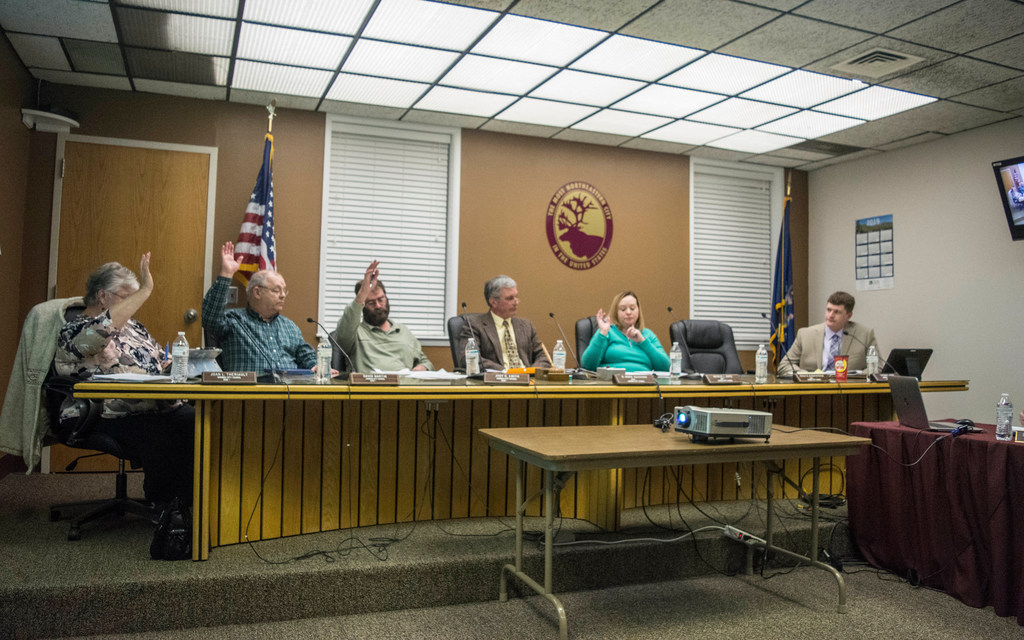
CARIBOU, Maine — City councilors voted four to two in favor of approving the 2019 revenue projections budget, which is slightly higher than last year.
Councilors approved the 2019 expense budget in December, which was $10,002,814 or 2.97 percent higher than last year’s budget of $9,174,078.
Including enterprise funds, which are revenues the city has to spend on a specific department or program such as housing, snowmobile trails, and economic development, the revenue projections for 2019 are $10,352,487, according to City Manager Dennis Marker. These projections are $161,643 higher than the unaudited year-end total revenues in 2018 and $10,438 higher than the 2018 revenue projection, he told councilors during their Feb. 25 meeting.
Despite that revenue forecast, Marker said that current budgetary estimates indicate a possible mill increase of $1.70 per $1,000 of property valuation when taking the County’s request for an additional $50,000 and an estimated four percent increase in education costs.
Marker said the biggest difference in the revenue projections compared to last year is that Caribou will be receiving roughly $640,000 from Aroostook Waste Solutions, a name given to the entity that formed after Presque Isle merged with the Tri-Community Landfill, which consisted of Caribou, Limestone, and Fort Fairfield.
As of now, the city anticipates spending $70,000 of that extra revenue on the River Road repairs, and placing $200,000 in a reserve, or rainy day, fund. It is up to councilors to determine how the rest of those funds should be spent, the city manager said.
This year, Marker said he is anticipating a drop of revenue from the Caribou Fire and Ambulance department.
“Cuts are being made in Medicare, Mainecare, and just in the insurance industry in general,” he said. “It’s not because the service or number of callouts is dropping, it’s actually trending upward, but because of what’s happening in the industry we are seeing less compensation come to us for those [calls].”
He said that while insurance cuts are a national concern, they pose particular troubles to rural emergency service providers.
Councilor Jody Smith asked when property taxes would be determined, and Caribou Tax Assessor Penny Thompson said typically not until June.
“Business and personal property returns are not due until May 1, and that’s a state issue,” she said. “We’re not going to have all of those, as many treat the deadline as a suggestion, so June is most likely.”
Councilor David Martin made a motion to accept the revenue projection so “the finance department can get to work.”
Councilor Thomas Ayer recommended that councilors take an additional two weeks to look through the budget “so we can really have a good crack at this,” and Marker said the two weeks would not have a significant impact.
After being asked by Mayor Mark Goughan about the projections, Marker said it did appear that a mill increase of about $1.70 per $1,000 of property valuation is possible.
Marker said that the city’s valuation and school budget are currently unknown, but that Aroostook County’s request is going up by $50,000. Even with the money from Aroostook Waste Solutions, Marker said a mill increase is likely this year.
Goughan asked if he took into account a possible increase from RSU 39, and Marker said the budget has calculated a four percent increase in Caribou’s share of the education budget.
Martin, with his motion still on the floor, suggested moving forward and approving the revenue budget.
“The revenue budget is not like the expense budget,” he said. “We’re not capping the revenue, we’re just projecting the revenue. If we get more, than that’s even better, and waiting two weeks is not going to change anything except that the finance department has to wait two more weeks to get going.”
The councilors ultimately voted 4-2 to approve the projected revenue budget, with Ayer and Goughan opposed.







